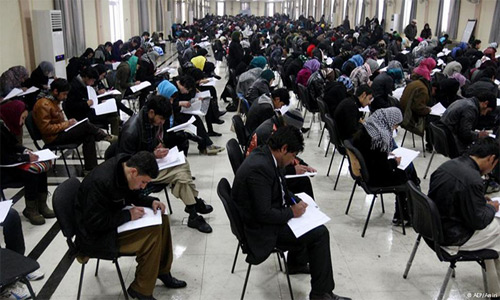Last Wednesday, the Ministry of Higher Education announced the kankur (university entrance exam) result of 2019 indicating that 61 thousand students admitted to the public universities. According to the acting minster of the higher education, Abdul Tawwab Ballakarzai, 180,000 students were registered to enter universities of which 170,000 participated in the Kankur exam while 61 thousands succeeded to admit the state universities. Mr. W. Karzai also added that other 15 thousand individuals went to semi-higher educational centers; 77 thousand went to private higher educational centers and 20 thousand people failed.
According to most students and people, the Kankur system have relatively been improved comparing to few years ago; indeed, the new kankur management system is a good example how to restore the public trust as it has been taken in a peaceful and transparent manner while few years before, there were a lot criticisms and protests against Kankoor exam when it was announced. Sound and successful management of nearly 200 thousand volunteers of Kankur exam is a great and positive experience for the Afghan leadership and considered a fundamental step towards system building in the country. It is expected to expand the model into other administrative arena of the country.
It said that this year’s exam was taken according to the new plan in which 33 provinces of the country were divided into 6 zones, the eastern zone including Nangarhar, Laghman, Kunar, Nuristan and Kuchi. In the southeast, there are Khost, Paktia, Paktika, Logar, Maidan Wardak, Ghazni and Kuchi. Provinces of Kandahar, Helmand, Uruzgan, Zabul and Kuchi are in the southwest zone. The western zone comprises of Herat, Badghis, Farah, Nimroz, Ghor and Kuchi.In the north-east zone, there are Kunduz, Badakhshan, Takhar, Baghlan and Kuchi. In the northern zone, there are Balkh, Jawzjan, Samangan, Saripul, Faryab and Kuchi. In central zone there is Parwan, Kapisa, Panjshir, Bamyan, Daykundi and Kuchi. According to this plan, 75% of university entrances are as before but 25% are privileged to native students. However, this point has raised some criticism in the social media networks. For example, this morning several students were posted in face-book which has not been accepted with 300 points while the native privileged students were accepted with around 160 points.
Anyway, the earlier mechanisms and systems that existed in the country, especially in the field of Kankoor exam faced great frustrations and failures in the country. The failures of past years and the great controversy that arose after the announcement Kankoor result, is not far from expectation in the countries like Afghanistan. From 2012 onward, we have witnessed widespread controversy and protests over the Kankoor result, but in two or three last years it greatly decreased. Undoubtedly, part of these protests and controversy were righteous as result of corruption, poor performance of relevant institutions and weaknesses in the Kankur management system. But more important and more destructive than the protest was the prevalence of distrust vastly promoted in the public arena, especially when people completely lost their confidence in the Kankoor public exams.
Unfortunately, the mistrust was not limited to the Kankur process or just inside the Ministry of Higher Education, but it was the basis for all distrust, controversy and subsequent crises. The root of this distrust was in the old management system and lack of technological infrastructure in the Ministry of Education. But in recent years, the situation in the Ministry of Higher Education has improved, especially in the Kankur management system no longer witnessing any controversy after the Kankoor result announcement. This indicates that the ministry has built an efficient system for kankur exam, and so the public trust in this office is being gradually restored. Now, the Ministry of Higher Education and the National Center of Examinations can be highlighted as a successful model of management among other ministries to learn from these experiences.
We should not forget that the name of our country is still lie in the top list of corrupt countries, and many of the country’s departments have not been able to take an important step towards eradicating corruption and returning public confidence. According to experts, the main barrier against fighting corruption is the corrupt structure and so, the success of Kankur is more likely to come from its structural changes. Undoubtedly, structural reform is not an easy job as considered as history rooted corruption but nothing is impossible; history rooted corruption is naught against historic will to bring deep and structural reform in the country.
Therefore, it must be acknowledged that still there are some deeper rooted issues which needs firmer will. For example, despite major reforming efforts in recruitment process, still there are challenges and problems in the system. However, the Administrative Reform Commission, which somehow deals with the exam and the national curriculum, has taken good steps towards recruitment test but there are still a lot of tales and talks about the performance of this department. In spite of the modification of the civil service law and creating of new hiring mechanism, the success of the department has been very low in the field of exams and public trust building. Therefore, it is suggested that not only the Administrative Reform Commission, but also all departments of the country should learn from the higher education, especially in victorious management of Kankur exam in the country.
Finally, as much as the infrastructure of the agencies is corrected, the corruption and injustice will decrease. As much as corruption and injustice go down, the public confidence will increase. Because there is a serious link between sound management, provision of better services, provision of social justice, return of public trust in the government, and, ultimately, the reduction of historical crises in the country.
Home » Opinion » General Kankur: New Example of Good Management in Afghanistan
General Kankur: New Example of Good Management in Afghanistan
| Mohammad Zahir Akbari

